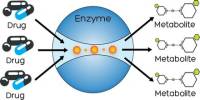A proof-of-concept experiment sponsored by the Universities of Birmingham and University Hospitals Birmingham NHS Foundation Trust has discovered a medication that may help some COVID-19 pneumonia patients.
COVID-19 pneumonia is a life-threatening infection. Pneumonia is a lung infection that causes inflammation in your lungs’ small air sacs. It’s possible that they’ll fill up with so much fluid and pus that it’ll be difficult to breathe.
The CATALYST trial looked examined namilumab (IZN-101), a drug developed by the UK-based biopharmaceutical company Izana Bioscience, as a potential treatment for COVID-19 pneumonia patients who were receiving ‘standard’ therapy but had high levels of C reactive protein in their blood (CRP).
CRP levels rise when the body is inflamed, and elevated CRP levels have been discovered to be a potential early indication for COVID-19 severity risk. COVID-19-associated pneumonia was previously known as novel coronavirus-infected pneumonia (NCIP). It was dubbed COVID-19 by the World Health Organization, which stands for coronavirus disease 2019.
Namilumab is an antibody that targets a cytokine that is typically released by immune cells in the body but is thought to be a primary driver of the excessive and severe lung inflammation seen in COVID-19 patients. It is already in late-stage trials to treat rheumatoid arthritis.
Patients over 16 with COVID-19 pneumonia were treated on wards or in the Intensive Care Unit (ICU) at nine NHS hospitals across the UK during the trial, which was conducted in collaboration with the University of Oxford and funded by the Medical Research Council and ran from June 2020 to February 2021.
The trial included 54 patients who received ‘usual therapy,’ which included steroids, oxygen, or ventilation depending on the severity of the condition and 57 patients who received usual care plus a single intravenous dosage of 150mg of namilumab.
Our research has provided important proof-of-concept evidence that namilumab reduces inflammation in hospitalized patients with COVID-19 pneumonia. However, our sample size is too small for a definitive assessment of clinical outcomes, and further studies are required for this, as well as to understand better the population that may benefit most. Our results may not generalize to hospitalized patients without evidence of pneumonia or raised CRP or patients not requiring hospitalization. It is important, therefore, that namilumab is now prioritized for further COVID-19 research in a much larger national Phase III clinical trial.
Dr. Ben Fisher
All research subjects had CRP levels greater than 40mg/l, in addition to COVID-19 pneumonia. The researchers compared the likelihood of lowering CRP levels in patients. When compared to individuals who received only conventional care, the researchers discovered that those who received namilumab had a 97 percent chance of seeing their CRP drop over time.
The patients were tracked for 28 days, and the results showed that those who received namilumab had fewer deaths and more hospital or ICU discharges than those who received standard care alone.
By day 28, 78% (43) of patients who received namilumab had been discharged from the hospital or ICU, compared to 61% (33) of patients who received standard care. On day 28, 11 percent of the namilumab group (six people) were still in the hospital, compared to 20% (eleven people) in the standard care group.
COVID-19 instances are severe in about 15% of the time. A condition known as acute respiratory distress syndrome (ARDS) can develop in people who have pneumonia. It’s an illness that strikes suddenly and creates respiratory difficulties.
By day 28, 11% (6) of individuals in the namilumab group had died, compared to 19% (10) of those in the usual care group. The researchers calculated the differences in the overall chance of being discharged from ICU or a ward at 28 days between the two cohorts.
The usual care cohort had a 64 percent chance of being discharged on day 28, while the Namilumab cohort had a 77% chance. The usual care group had a 47% chance of being discharged on day 28, compared to 66 percent in the Namilumab group.
Dr. Ben Fisher, co-chief investigator of the CATALYST trial at the University of Birmingham’s Institute of Inflammation and Ageing, and Consultant Rheumatologist at University Hospitals Birmingham NHS Foundation Trust (UHB), said:
“Our research has provided important proof-of-concept evidence that namilumab reduces inflammation in hospitalized patients with COVID-19 pneumonia. However, our sample size is too small for a definitive assessment of clinical outcomes, and further studies are required for this, as well as to understand better the population that may benefit most. Our results may not generalize to hospitalized patients without evidence of pneumonia or raised CRP or patients not requiring hospitalization. It is important, therefore, that namilumab is now prioritized for further COVID-19 research in a much larger national Phase III clinical trial.”
Dr. Someit Sidhu, Co-founder of Izana Bioscience, said: “We are proud to support the CATALYST trial led by the highly experienced team at the University of Birmingham and UHB, Europe’s largest integrated critical care center.”
“We believe namilumab can play a significant role in dampening the hyper-inflammation seen in patients with severe COVID-19 infection and are committed to working with regulators and partners across the world to ensure this potential therapy can be developed for patients with COVID-19 who urgently need treatments. This is a particularly significant moment for me, supporting the global response to this pandemic through the work of the team at University Hospital Birmingham the hospital where I trained as a junior doctor before going on to found Izana.”
The CATALYST team also examined infliximab (CT-P13), a medication that is currently used to treat inflammatory diseases. They compared 35 patients who received ‘usual care’ and a single intravenous dosage of 5mg/kg of infliximab to the same patients with COVID-19 pneumonia and CRP levels greater than 40mg/l who received ‘usual care’ and a single intravenous dose of 5mg/kg of infliximab.
Infliximab, on the other hand, was shown to be no more effective than standard therapy, with just a 15% chance of lowering CRP.
Dr. Fisher added: “Our findings relating to infliximab, while disappointing, are also important as we continue to investigate and identify existing and new anti-inflammatory drugs that may play a critical role in targeting and reducing the most serious symptoms of COVID-19.”
CATALYST is being run in close partnership with UHB and the Birmingham National Institute for Health Research Biomedical Research Centres (NIHR BRC) and delivered in close collaboration with the NIHR BRCs at Oxford, Imperial College London, and University College London. It was designed by the Inflammation Advanced and Cell Therapy Trials Team (I-ACT) at the University of Birmingham’s Cancer Research UK Clinical Trials Unit.
















